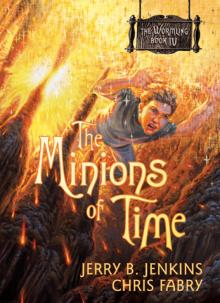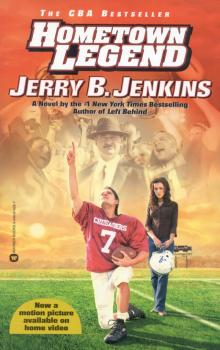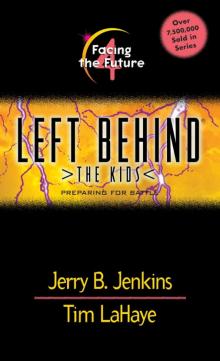- Home
- Jerry B. Jenkins
Though None Go with Me Page 15
Though None Go with Me Read online
Page 15
“Should you start looking, hon?”
He shook his head. “We’re safe at my level, but there’ll be no raises for a while. We’re asking mid-level managers to take a cut, and we can’t cut them if we’re not willing to take a hit too. And here we had only about a year to go on our mortgage.”
“I know, Will. You’ve done great.” She followed him upstairs, grateful the kids seemed preoccupied.
“Could have done better. We haven’t watched the budget the way we’ll have to now. We could have paid off the mortgage by now and been ahead of the game.”
“You couldn’t know this was coming.”
“I’m the comptroller,” he said, “yet I underestimated it.” He stood and shook his head. “All F-M needs is one quarter where the demand for product matches one of the quarters from last year, and our fortunes turn.”
But things grew darker. Elisabeth hated the look on Will’s face when he announced the first pay cut. “It’s severe,” he said. “The car will sit until I get back to my previous salary. I’m willing to walk. Are you?”
“Whatever you say, Will. I believe God will see us through.”
Elisabeth believed that had to be the worst of it, but banks closed and businesses failed every day. More neighbors went bankrupt. One day Will came home and, without a word, changed clothes and began digging a huge garden in the backyard. She rushed out. “What is it?”
“Can’t you guess?”
“Another cut?”
He nodded and kept working.
“You love corn, beans, onions, and carrots, don’t you, sweetheart?” she said. He nodded again. “Take a break and have a lemonade while you keep an eye on the kids. I’ll be right back.”
She walked to the grocer and returned with seeds and bulbs. “Will,” she said. “We’ll beat this.”
His mood had brightened some. He showed her his lemonade, a couple of shaved lemon peelings in a glass of water. “I didn’t even waste ice,” he said.
His pay was cut again the next quarter and one more time the next. Inside a year his salary was reduced four times, parts of the plant had been shut down, and the workforce decimated.
“I’m still willing to work,” Elisabeth said.
“We’ve been through that,” he said. He took seriously the scriptural mandate for a man to provide for his family and for a mother to nurture her children. “Besides, your working wouldn’t net us enough to be worth it, with babysitting and all. I appreciate it, but the discussion is over.”
The final blow came at his next quarterly review. Despite being one of the senior officers, he told her, “If I choose to stay, my rate of pay remains the same.”
“That’s like a raise in these times,” Elisabeth said.
He hesitated. Then, “The rate of pay is the same, but all they can offer is half a week’s work.”
“How do they expect us to live?”
“It’s generous, Elspeth. You should see what this means to the men on the line. They’re down to almost no pay and glad to have work.”
Elisabeth found no shame in looking for bargains, pinching pennies, wearing clothes until they needed mending, and then wearing them some more. Businesses that extended credit gradually reduced the payments so people could pay at least something. Some credit loans were suspended indefinitely in the hopes that when the economy turned, people would remain loyal and do the right thing.
Elisabeth cut off the telephone service, even the newspaper. She no longer bought beefsteak. She expanded the garden to cover the entire backyard, and what could not be consumed or canned she sold for pennies, which she hoarded.
She made egg sandwiches for Benjy’s lunch. He told her one day, “I traded mine for a meat sandwich.”
“Meat?” she said. “Who can afford meat in their sandwiches?”
He told her the boy’s name. “Will,” she whispered. “They live in the fourth ward, and his father’s out of work.”
Will told Benjy, “Save a quarter of that meat sandwich tomorrow and I’ll trade you a jawbreaker for it.”
“Is that what I think it is?” Will said, sniffing the evidence the next day and showing it to Elisabeth.
She nodded. “Dog food. Canned horsemeat. Benjy! Come in here, please!”
In the midst of adversity Elisabeth felt closer to God than ever. She continued her open communication with him, rose early to read, and stayed as active in the church as her schedule would allow. Benjy caused her no end of grief, responding to neither discipline nor punishment and only a select few forms of positive reinforcement. She agreed with Will that rewarding him for merely acceptable behavior set a dangerous precedent.
Betty, about to start school, had improved not at all. The combination of medicines and humidifying contraptions had become so confusing and ineffective that Elisabeth began praying for a miracle. The poor child didn’t deserve this, and Elisabeth worried that Betty would never know a normal life and never have a reason to smile.
Meanwhile, little Bruce was as engaging as ever, providing Will and her with diversion and entertainment. He was a generous, giving child, and she worried that he got less of her attention merely because he had fewer needs than the older two.
Will tried to maintain his civic activities, even adding a few volunteer positions. Elisabeth privately resented his increased time away during the evenings, but she knew service was part of his makeup. He had to do and to give and feel needed. She needed him too, but she couldn’t complain. When he was home and had a spare hour before bed, he studied correspondence management courses from LaSalle Extension University.
“In times of adversity,” he explained, “most people struggle to get by. I believe God would have me ready to advance as soon as the climate changes.”
When their money was nearly gone, Will talked to the bank about refinancing the mortgage. He told Elisabeth it would help their case if the whole family showed up to illustrate the need. It was all she could do to keep Benjy reigned in while Will was pleading his case.
“I’m sympathetic,” the loan officer told him. “But we simply don’t have the capital. If I were going to extend credit to one customer, it would be you. You’re the moneyman at the biggest plant in town. When this economy turns, you’ll be back up to hundreds and hundreds of workers, and we want to keep doing business with you. My cards are all on the table, sir. I find myself in the unenviable position of having to turn you down flat and beg you to understand and not make me suffer for it later. If I had dime one, I’d lend it to you right now. In fact, if you need a personal loan, just between us, and anything short of a hundred dollars would help you, you name it.”
That, Will told Elisabeth later, sounded too much like charity. “If I can’t borrow against a piece of real estate like ours, I don’t want a loan. We’ll make it.”
“You won’t hold it against the banker, will you?”
Will shook his head. “If it wasn’t for Fairbanks, Elisabeth, that bank would have closed a year ago. I know if they had it, they’d lend it to me.”
Elisabeth wasn’t listening. He had thrown her off. “What did you just call me?”
“Pardon?”
“You just called me Elisabeth.”
“So?”
“Elisabeth! Will! You’ve never, ever called me Elisabeth.”
He looked lost. “Isn’t that your name?”
“Not to you it isn’t! You’ve been working too hard, Will Bishop. You’ve called me Elspeth for longer than I can remember, and you’re the only one I let do it. Now what’s this Elisabeth?”
He smiled but looked embarrassed and seemed to try to cover. “You told me I sounded hick saying Elspeth.”
“When did I ever say something like that?”
“In fourth or fifth grade.”
She swatted his arm. “That doesn’t count. You were hick then. Elspeth has always been your name for me.”
“Yes, ma’am,” he said.
She hugged him. “That was a new one, Will, I must say.”
He went upstairs muttering, “Didn’t seem that big a deal …”
Elisabeth found that while praying for her family, she mostly thanked God for Will and requested more rest for him. With Benjy she prayed for patience and a dramatic change in his behavior and, more importantly, his character. He was as difficult in church and Sunday school as in grade school, and she was embarrassed. Elisabeth herself had clucked about parents who didn’t control their children. She knew people already considered her a failure.
For sickly Betty her prayers were simply for relief, for the child as well as everyone else in the family who suffered with her and because of her. Elisabeth loved her, but she found pity wearying. She could barely stand to watch and listen as the little thing wheezed and dripped and groaned and cried all day. It was hardly Betty’s fault, yet Elisabeth battled resenting her for the incessant irritation.
Bruce was easy to pray for. She simply asked that God use all the incredible gifts he had clearly planted in the boy. By age four he was reading, conversing with adults, even doing sums. One day a pastry vendor pushed his cart past the house, advertising donuts two for five cents. Bruce looked at Elisabeth, beaming, and pulled a nickel from his pocket. He had been carrying it around for weeks. “You want a donut, Mom? Do ya, huh? Do ya?”
“You want to buy a donut for each of us?”
“I want to buy one for Daddy and Mommy and Benjy and Betty and me!”
“You can buy only two.”
“Nuh-uh.”
“Yes. Read the sign and figure it out.”
Other kids and a neighbor lady had stopped the cart. Bruce looked at it, looked at Elisabeth, looked at his nickel, and set off. He stood at the edge of the little mob surrounding the cart until the vendor noticed him. “And what might I do for you, little one?” he said.
Bruce had the nickel hidden tight in his fist. “Can I just have one donut for a penny?”
Elisabeth was surprised. He knew full well the difference between a nickel and penny. She had laid it out for him on the table, showing him how many pennies equaled a nickel.
“Hm,” the vendor said. “Two for a nickel comes to two and a half cents each.” Bruce stood staring at him with a beseeching look. “But sure, I can give you one for a penny.”
As the vendor grabbed one with a sheet of waxed paper, Bruce said, “Good!” and opened his hand to reveal the nickel. “I’ll take five!”
The vendor roared and the crowd cheered as Elisabeth came running. “No! No!” she said. “Two will be fine.”
“Are you kidding, ma’am?” the pastry man said. “The pitch alone was worth the loss of margin!”
“Please, don’t feel obligated.”
“Give the boy the five,” a woman said, wiping her eyes. “I’d pay for ’em myself just for having seen a little businessman in the bud!”
Elisabeth finally let Bruce take the five donuts. He carefully set aside the three for the rest of the family and later took great pride in presenting them. Whenever he saw the pastry vendor he ran toward him yelling, “One for a penny?”
The vendor pretended to be irate and said, “No more of that from you, you little rapscallion! Now off with you!” and Bruce ran away, squealing with delight.
Money got so tight that Elisabeth began taking in laundry. Will was not happy about it, but he allowed it because, “at least you’re here. And we can use the money.” He helped out in a grocery store and sold soda pop from a stand on the beach after work and on Saturdays during the summer. He spent his two and a half days off each week working for the city’s public works department, once tearing up and relaying pavement bricks for the installation of streetlights. He told Elisabeth he had not worked so hard since high school, but the extra fifteen dollars carried them another week.
Just when Elisabeth thought she could never love Will more than she did, she discovered another facet to his personality or heard another amazing story. He ran a small savings and loan department out of the office at Fairbanks for the benefit of hourly employees. It was small potatoes, and mostly men on the line invested for a small return or borrowed for emergencies.
Will mentioned that one day a worker requested a larger than average loan for an operation, the last hope for his ailing daughter. “We didn’t have enough cash on hand, so I asked a couple of the guys who seemed to save regularly to put in a little extra if they could, so we could extend the loan. Not only would they be helping this man and his daughter, but also everybody who invested would share the risk. They did, and we made the loan. Today the man’s daughter is improving.”
“That’s wonderful, Will. Do you realize you did that?”
“Yeah,” he said. “I’m somethin’, ain’t I?”
“Seriously, how does that make you feel?”
“I wish someone would do the same for our company.”
It seemed to Elisabeth that when one part of their lives improved, another deteriorated. The book of Job told her that “man is born unto trouble, as the sparks fly upward.” She didn’t expect clear sailing, only the knowledge that God was their rear guard. She didn’t hesitate to remind him—as if he needed it—that she had made a pledge of obedience and that with his help, she intended to keep it.
When the Depression finally started to lift and Will went back to work full-time for about three-quarters of his old salary, Elisabeth felt as if they could breathe again. They would never be on easy street, but the Depression had taught her and—she knew—everybody else who had lived through it a valuable life’s lesson, one they should have known all along: “Lay not up for yourselves treasures upon earth, where moth and rust doth corrupt, and where thieves break through and steal: but lay up for yourselves treasures in heaven, where neither moth nor rust doth corrupt, and where thieves do not break through nor steal. For where your treasure is, there will your heart be also.”
“Lord,” she prayed, “I want you always and only to be my treasure.”
For months Elisabeth dreamt about running completely out of money. She and Will discussed often how that terrible season had affected something fundamental in their thinking. Never again would they take money for granted. Never again would they feel comfortable with their means.
Despite some financial relief, Elisabeth faced more trouble with the children. Benjy was forced to repeat third grade and responded with anger and mischief that alarmed the neighborhood, the school, and the church. Twice he was associated with suspicious fires, both times denying involvement; then he was caught red-handed setting fire to a wastebasket in the bathroom at church.
Betty had to be hospitalized three weeks in the spring of 1931, and other parents complained they didn’t want the distraction of her asthma—which they wrongly assumed was contagious—in the classroom.
Bruce was a precocious first grader, smartest in the class and happy to play the role. He had to sit out of arithmetic and spelling drills so as not to dominate. He read the Bible and other adult books, especially encyclopedias, including the Book of Knowledge, which he methodically worked through, volume by volume.
In his spare time he ran a variety of businesses, from a lemonade stand to selling vegetables door to door. It seemed every moment of his day was filled with wonder and excitement. And he was eager to go to bed on time, because that meant he could read until he fell asleep.
One day that summer, as Bruce explored the rocks near the footbridge, Elisabeth toiled in the garden. What had begun as an economic necessity now seemed a frugal venture she might never give up. As she worked she hummed hymns and prayed and thanked God for bringing them through the Depression. It seemed the whole town was coming carefully into the light from the darkness of money woes. All of Three Rivers, indeed the whole of Michigan and most of the country, was breathing a collective sigh of relief. No one who had lived through the Depression would ever be the same.
Elisabeth kept an ear open for Bruce’s whistling or singing or chatter. Even when alone, he kept himself entertained with running dialogues and com
mentary, making up stories and situations. Her thighs aching from squatting too long, she sat back and pulled off a glove to wipe her forehead. And she saw Bruce.
He hung precariously from the bridge by one hand, peering at something beneath it. Elisabeth started to yell but thought better of it. If she startled him …
She loved his curiosity, but this was reckless. She stood gingerly, hoping she could approach casually and tell him to carefully come back. He twisted for a better view, and before she had taken a step toward the river, his hand slipped, he swung and banged his head on the superstructure, and he dropped into the river. With a shriek Elisabeth ran toward the bank. Bruce was clearly unconscious, carried downstream by the swift current.
She sprinted toward the bridge, but Bruce was way past it already. Elisabeth could outrun the river, but she realized that once she plunged in she would never be able to swim fast enough to keep up. Where might he wind up? What might he hit? She could see his face, but not his mouth. If he came to and sucked in water in a panic, he would go under. She would lose him.
Elisabeth cried out, “God, help me! Help me save him! God! Please!” She had to get ahead of him before she entered the water to have a chance. She let her shoes fly off behind her and, gasping for breath, raced thirty yards ahead of him.
Her old yardwork dress, long-sleeved and ankle length, flapped behind her. As she neared the place of no return the edge of the river went from grass and sand to rocks, and she had to slow to keep from stumbling or cutting her feet. With nowhere else to go, she took a sharp right and dove into the water.
Her dress instantly doubled in weight and the skirt billowed like a submerged sail in the current. She fought to keep from being dragged downstream. She had to allow Bruce to catch her. Desperate, flailing, she maneuvered into his path, saw the strawberry scrape on his forehead, and even saw his eyes pop open. Don’t panic! she pleaded silently. “Swim to me!” she screamed.
Bruce’s eyes grew wide and he thrust out an arm to keep from sweeping past her. She grabbed him in a fierce grip he couldn’t have broken if he’d wanted to. She wanted to scream but let him do that as she kicked hard and shifted her body weight till the river deposited her onto a collection of rocks.

 The Betrayal
The Betrayal The Valley of Dry Bones
The Valley of Dry Bones The Minions of Time
The Minions of Time Wild Rescue
Wild Rescue Though None Go with Me
Though None Go with Me Hometown Legend
Hometown Legend The Breakthrough
The Breakthrough The Youngest Hero
The Youngest Hero Nicolae High
Nicolae High Through the Flames
Through the Flames The Brotherhood
The Brotherhood Grave Shadows
Grave Shadows The Changeling
The Changeling Shadowed
Shadowed Precinct 11 - 01 - The Brotherhood
Precinct 11 - 01 - The Brotherhood Second Chance
Second Chance Silenced
Silenced The Vanishings
The Vanishings Dead Sea Rising
Dead Sea Rising Soon
Soon The Author's Blood
The Author's Blood The Sword of the Wormling
The Sword of the Wormling Left Behind - The Kids 02 - Second Chance
Left Behind - The Kids 02 - Second Chance Haunted Waters
Haunted Waters The Underground
The Underground Mark's Story
Mark's Story Shaken
Shaken Deceived
Deceived Frantic
Frantic Riven
Riven Facing the Future
Facing the Future Stung
Stung I, Saul
I, Saul Hunted
Hunted Arrived
Arrived John's Story
John's Story Stolen Secrets
Stolen Secrets